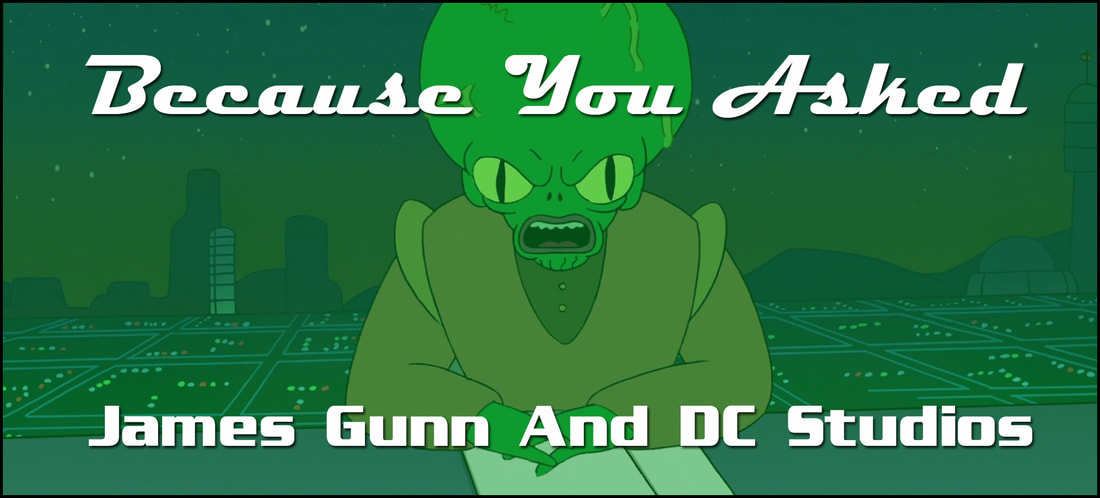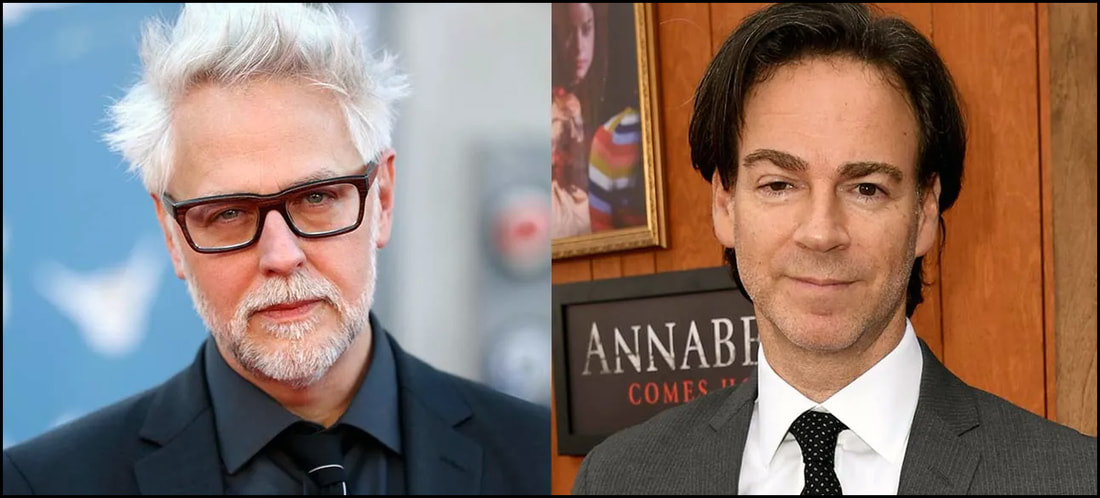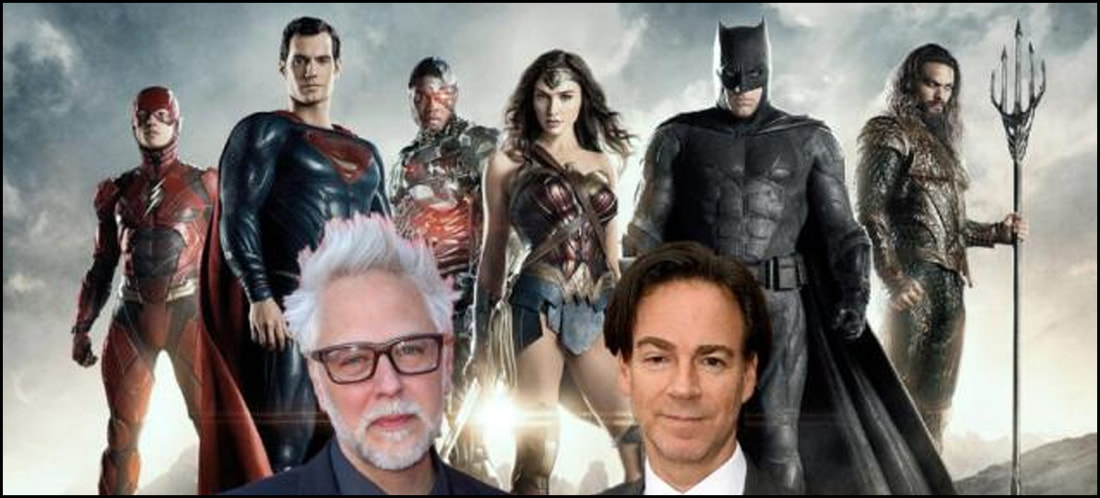Good morning, and welcome to February, happy readers! Here's hoping that your 2023 is starting out on the right foot. If it isn't, then please please please just try to find a little comfort that your year has to, at least, be going better than Warner Bros. and DC Studios' year is going.
As I've not kept it any secret over the years that -- when it comes to comic book intellectual property -- I've always been more of a DC Comics guy than I ever was a Marvel. For whatever reason, the DC characters have always just appealed to me personally much more than any of the other publisher. I've always argued that it's most likely owed to the fact that I was kinda/sorta raised on DC heroes; at the time that I was offered an entry into the Marvel Universe of books, nothing I read just really lit a fire in me, so I rarely read them with any consistency. Such is the way of life, I guess.
In any event, a longtime observant reader -- one who saw the (cough cough) high-priced DC Studios midweek presentation about their (cough cough) all-new line-up -- actually reached out. This person clearly has read SciFiHistory.Net (thank you!) well enough to know my preference of graphic characters, and he wanted to know -- in short -- whether or not I felt the addition of James Gunn to the management and development roster was going to make any difference in the box office of the DC Universe.
The short answer is: no/maybe.
But I'm fully prepared to write a bit more for folks who do like to read.
Now, keep in mind, please: I've no bone to pick with Gunn and his partner Peter Safran. While I am of the mind that Gunn likely has some personal issues in his life regarding his -- ahem -- predilections (anyone with a brain knows full well the guy has Tweeted thousands of times in the past about his sex life, jokes or not), I'm capable of separating my low opinion of him as a man with my honest opinion of him as a storyteller ... if for no other reason than it makes me tolerant of different media types. His past caught up with him at the Mouse House, and he was understandably fired. The outcry from the Marvellites and Hollywood -- and probably the fear over diminished receipts -- saw him brought back into the fold, and -- on that front -- we are where we are.
Gunn's scripts and/or various projects have always centered on what I think is safe to say are an assortment of oddball characters. They're those players who rise up and become heroes sometimes in spite of themselves if not even some times just to spite those they find themselves surrounded by. Occasionally vile, they might even be considered more appropriately to be anti-heroes (of a type), typically defined more by what makes them different than what makes them -- erm -- functional members of any society.
In many cases, this perspective can open the door for some fabulous and inventive tales. Characters who view the world from a unique vantage point can be sources of inspiration, often times appealing to audiences who might even think of themselves as being just out-of-step with the wider world. Fans might understandably identify with them, and it goes without saying that this contingent of any audience will cheer these adventures -- the good, the bad, and the ugly. In many ways, this dynamic practically describes the whole comic book industry and its readership: a reasaonbly small percentage of society actually reads graphic installments on a consistent basis, and these outsiders like to think of their respective colorful universes as being all of their own.
And, no, I don't think that there's anything wrong or even remotely unstable about that. Taylor Swift fans consider themselves the same way, and nobody finds them unstable! (Well, to a degree, anyway ...)
In fact, there's a whole book out there -- I'm pretty sure it's called The Many Lives Of The Batman -- which includes a fabulous essay about how Warner Bros. and DC Comics collaborated over the better part of a decade to build a market specifically for a big budget Batman movie. At some point -- let's say in the early 1980's -- they realized that the theaters had essentially dried up of comic book projects, so they began properly seeding the market for not a small return but a vast, explosive one ... with a name director ... with big name talent ... and the marketplace responded in kind. Granted, if it had been a failure, then we might not even be where we are today. It wasn't, and this pretty much set the first stone in a foundation that continues growing today.
However, I'm not so sure that anyone can argue Marvel's success is owed to fringe elements. Their Iron Man largely became their 1989 Batman movie, and then they rather quickly seized the opportunity that DC and Warner Bros. basically ignored; and such moxie was rewarded by an audience hungry for such visual entertainment. They added a whole wing or two to that whole foundation, each one with another relatively well-known character and only then started tinkering with some second-tier heroes and villains. Smartly, they went big when the door swung open, and -- as anyone can see -- they've been amply rewarded at the box office.
But their core group -- say Iron Man, Captain America, the Hulk, Thor, etc. -- were not fringe players. Within the comic book industry, these are established commodities. Using these well-known identities, Marvel has -- without question -- made superhero films part of the mainstream, all for the good, the bad, and the ugly they are. (Yes, I know that many directors don't look on them as 'authentic films,' and while I understand and appreciate that perspective these films still perform for studios, so there's no denying the potential.) The point here is that whether or not the Hollywood industry wants to keep doing them or not they will very much keep producing them ... because they've become mainstream. They are what audiences have come to expect. There are more and more of them released each year. Like it or not, Martin Scorsese, they are here to stay for the foreseeable future.
Gunn and Safran's successes (if you want to call them that) hasn't necessarily translated to mainstream awareness. What I mean here is that no one knows James Gunn's name (at least, no one in the meat-and-potatoes America where I live), but his Guardians Of The Galaxy films are beloved to a degree. Peter Safran? I can probably count on one hand the number of people who know the name of Peter Safran; once I subtract from them those who are in his own damn family, then we're likely left with no one. Gunn and Safran -- despite what the press industry might be telling you -- are virtual unknowns; even Gunn's sexual preferences pretty much escaped the online hardcore political community, so we're not dealing with two guys whose identities alone are going to pull folks to the theaters.
Nothing about this "big announcement" gave me any indication that DC fans are going to get anything different from Gunn and/or Warner Bros. and/or DC Studios than what we've been given in the past. While maybe a bit more cash will be thrown into the mix, nothing in this announcement gave any indication whatsoever that things were a'changin', folks. Nothing. Nada. Zip. Zero. Zilch.
But ...
That's why I've always cautioned readers to never never never take too much out of announcements of this sort. They're public relations events. They're studio spin efforts. They typically give no substance and instead try to lightly persuade watchers to have faith, trust the plan, and go with the flow. They might even mildly suggest something like "you're spoken, we've heard you, and we're adjusting," but Gunn has been an outspoken blowhard vehemently arguing against fandom on Twitter and beyond, so if you thought you heard a bit of that and bought it then I have a bridge in New York I'd very much like to sell you.
Need I remind folks? It wasn't all that long ago that DC was promising the best Batgirl movie ever was going to see the light of day, and what happened to that project? A multi-million dollar flick was assembled -- one that everyone involved apparently believes was a work of art -- and it's been entirely shelved. Shelved. Written off. That doesn't happen every day of the week, but -- man, oh man -- DC and Warner Bros. shot off their mouth about it coming to theaters real soon, didn't they? And it wasn't all that long ago that Warner Bros. and DC Studios handed the baton to (cough cough) JJ Abrams, of all people? Do you remember that hype? I know I do. We were promised a whole assortment of new flicks, one that was going to be an alternate universe Black Superman (FYI: there are still WB execs who are saying it's still in development despite this 'whole new world'), and what happened to all of those? Again: nothing.
This is why I put absolutely zero stake in anything that comes from DC, WB, and/or Gunn and Safran. Until the damn thing hits the theaters, it ain't real.
Of course, I'm willing to cut Gunn and his team a bit of slack on this whole front because -- essentially -- he's bound to what the studio will ultimately let him do. Historically, Warner Bros. has not been a good partner for DC. I won't go into the wealth of examples I've read about over the years, but I will mention one that I recall: upon visiting the set for what I believe was the filming of Superman Returns, all one of the studio suits had to say (by way of 'suggestion') was to question why Superman had to wear a cape all of the time.
As a DC fan, do I hold out hope for the future?
Yes, yes, yes. I do. As much as it pains me to see franchises put in the hands of folks who may not have the future of these institutions at heart, characters like Batman, Superman, and Wonder Woman are bigger than life. They're bigger than any one storyteller, good or bad. They've stood the time of time and they endure. For better or for worse, they're a part of our cultural history, and they persist. Batman has had a few bad movies. Superman has had a few bad movies. Wonder Woman had a damn awful one called Wonder Woman 1984. And yet? They're still viable heroes with a bright tomorrow.
Can Gunn produce a successful incarnation?
Only time will tell.
-- EZ




 RSS Feed
RSS Feed